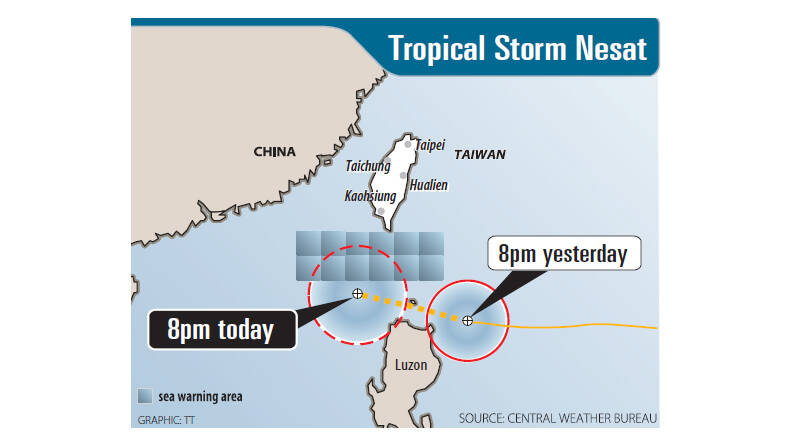The Central Weather Bureau yesterday issued a sea warning for the newly formed Tropical Storm Nesat, which was approaching the Bashi Channel between Taiwan and the Philippines.
The cyclone was upgraded from a tropical depression to a tropical storm at 2pm. As of 8pm, Nesat was 410km southeast of Oluanpi (鵝鑾鼻) on the southernmost tip of Taiwan, moving west-northwest at 18kph, the bureau said.
The storm had a radius of 120km and maximum sustained winds of 72kph, it said.

The bureau forecast that its periphery would bring extremely heavy or torrential rain to mountainous areas in Taipei from yesterday afternoon through this morning.
Heavy or extremely heavy rain was forecast for Yilan County, mountainous areas in New Taipei City, Keelung and Taiwan’s northern coast, as well as a chance of heavy rain in other areas north of Hsinchu, Taichung and the mountainous areas of Hualien.
The bureau defines heavy rain as accumulated rainfall of 80mm or more within a 24-hour period or 40mm or more in an hour. Extremely heavy rain refers to accumulated rainfall of 200mm or more within 24 hours. Torrential rain refers to accumulated rainfall of more than 350mm within 24 hours or more than 200mm over three hours.
The bureau warned of high waves in the coastal areas of Taiwan and its outlying counties.
Orchid Island (Lanyu, 蘭嶼), Green Island (綠島), and Penghu, Kinmen and Lienchiang counties, as well as coastal and open areas in western Taiwan and the Hengchun Peninsula (恆春半島), could experience wind speeds of 76kph to 104kph, it said.

CARROT AND STICK: While unrelenting in its military threats, China attracted nearly 40,000 Taiwanese to over 400 business events last year Nearly 40,000 Taiwanese last year joined industry events in China, such as conferences and trade fairs, supported by the Chinese government, a study showed yesterday, as Beijing ramps up a charm offensive toward Taipei alongside military pressure. China has long taken a carrot-and-stick approach to Taiwan, threatening it with the prospect of military action while reaching out to those it believes are amenable to Beijing’s point of view. Taiwanese security officials are wary of what they see as Beijing’s influence campaigns to sway public opinion after Taipei and Beijing gradually resumed travel links halted by the COVID-19 pandemic, but the scale of

TRADE: A mandatory declaration of origin for manufactured goods bound for the US is to take effect on May 7 to block China from exploiting Taiwan’s trade channels All products manufactured in Taiwan and exported to the US must include a signed declaration of origin starting on May 7, the Bureau of Foreign Trade announced yesterday. US President Donald Trump on April 2 imposed a 32 percent tariff on imports from Taiwan, but one week later announced a 90-day pause on its implementation. However, a universal 10 percent tariff was immediately applied to most imports from around the world. On April 12, the Trump administration further exempted computers, smartphones and semiconductors from the new tariffs. In response, President William Lai’s (賴清德) administration has introduced a series of countermeasures to support affected

Pope Francis is be laid to rest on Saturday after lying in state for three days in St Peter’s Basilica, where the faithful are expected to flock to pay their respects to history’s first Latin American pontiff. The cardinals met yesterday in the Vatican’s synod hall to chart the next steps before a conclave begins to choose Francis’ successor, as condolences poured in from around the world. According to current norms, the conclave must begin between May 5 and 10. The cardinals set the funeral for Saturday at 10am in St Peter’s Square, to be celebrated by the dean of the College

CROSS-STRAIT: The vast majority of Taiwanese support maintaining the ‘status quo,’ while concern is rising about Beijing’s influence operations More than eight out of 10 Taiwanese reject Beijing’s “one country, two systems” framework for cross-strait relations, according to a survey released by the Mainland Affairs Council (MAC) on Thursday. The MAC’s latest quarterly survey found that 84.4 percent of respondents opposed Beijing’s “one country, two systems” formula for handling cross-strait relations — a figure consistent with past polling. Over the past three years, opposition to the framework has remained high, ranging from a low of 83.6 percent in April 2023 to a peak of 89.6 percent in April last year. In the most recent poll, 82.5 percent also rejected China’s